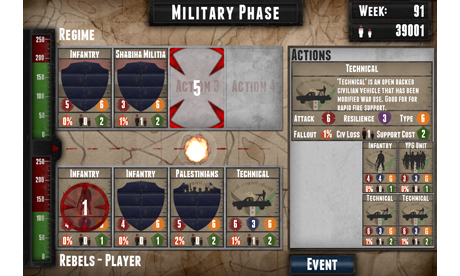
British developer Auroch Digital says its Endgame: Syria game has been rejected by Apple due to its political content.
The game, which is available already on Android and as an HTML5 browser game, is based on the current civil war in Syria, released as part of Auroch's GameTheNews project, which involves creating topical games based on news stories.
Auroch says the game fell foul of App Store guidelines on games that "solely target a specific race, culture, a real government or corporation, or any other real entity".
Designer Tomas Rawlings says he's disappointed by the rejection.
"We had hoped that Apple would be more nuanced in how they applied this rule but we got a bit worried when it had been in submission for around two weeks without a decision," he says in a statement.
"We then figured that because of the controversy of using the gaming medium to cover an ongoing war meant passing the game had become an issue for them."
The company will be changing the game and resubmitting it for App Store approval. "It does mean we'll have to strip some of the meaning and context from it to pass Apple's submission process and that is not ideal," says Rawlings.
"Our aim is to use games as a format to bring news to a new audience and submission processes such as this do make it a lot harder for us. I get that Apple want to make sure really offensive titles don't pass into their store, but ours is far from that."
It's a tricky subject. On the one hand, there's the argument that games should be able to explore topical news subjects, just as journalism does.
Apple would be extremely unlikely to reject, say, a special digital issue by The Economist on the conflict in Syria, although satirical cartoonists have been on the wrong end of its approval policies in the past.
The other side of the story, though, is the fact that games are games, not journalism: they put you into the action that's being covered, getting you to make decisions. That's the potential power of an initiative like GameTheNews, but it's also why these games will attract careful scrutiny from the likes of Apple.
The solution is dialogue between Apple and developers in cases like this, to establish (and evolve when necessary) the boundaries of its policies.
One more comparison: Smuggle Truck. A game by developer Owlchemy Labs that saw players smuggling immigrants across the US border, which was rejected by Apple in 2011, before being rejigged as Snuggle Truck with cuddly toy characters and winning approval.
At the time, Owlchemy said the original game wasn't flippant, but was trying to make a political point about "the absurd legal minefield that surrounds US immigration".
Endgame: Syria is more obviously 'serious' (in games industry parlance – serious gaming is an established sub-section of the industry) than Smuggle Truck, but both titles pose important questions for Apple.
With iOS devices increasingly important culture funnels for their owners, it's right that Apple's approval policies should be poked and prodded regularly to ensure the company is being a responsible gatekeeper.
In the meantime, iOS device owners can play the HTML5 version of Endgame: Syria, and judge the most important question in this whole debate: whether the game really does have the power to educate players about the conflict in Syria.

